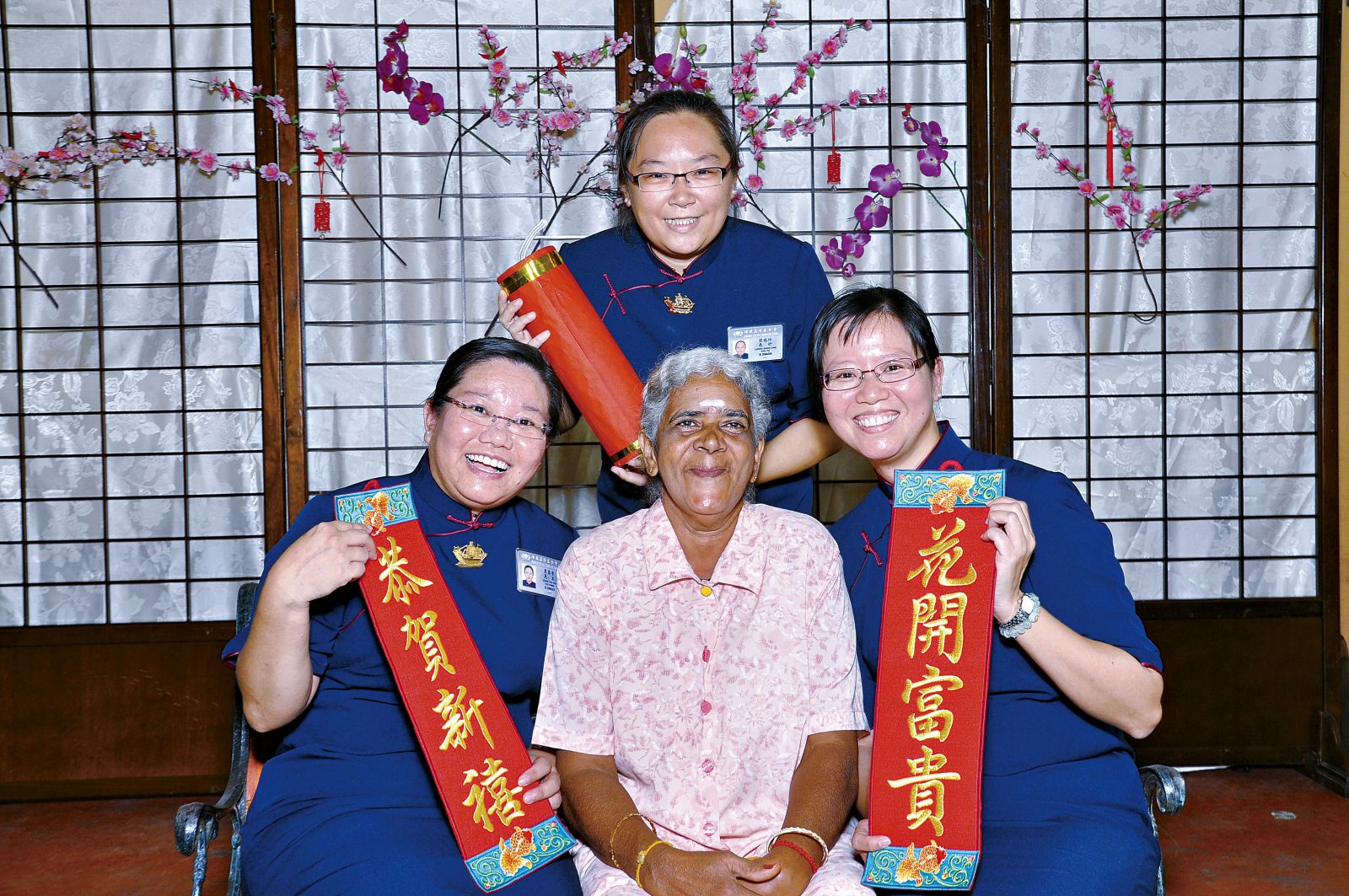Being There for Her for 17 Years
By Chum Yin Yin (覃盈瑩)
Translated by Wu Hsiao-ting (吳曉婷)
Photo by Liew Cheong Yen (廖昌豪)
Being There for Her for 17 Years
By Chum Yin Yin (覃盈瑩)
Translated by Wu Hsiao-ting (吳曉婷)
Photo by Liew Cheong Yen (廖昌豪)

Minachi poses with Tzu Chi volunteers while attending a year-end distribution conducted by Tzu Chi Kluang.
Tzu Chi volunteers still vividly remember the first time they met Minachi A/P Velaithan, a 55-year-old woman of Hindu descent who lived in Kluang, Johor, Malaysia.
In 2004, Minachi and her brother were referred to Tzu Ch for assistance. A group of volunteers subsequently visited the siblings in their home to learn what they could do to help. While the volunteers talked with Minachi’s brother, she sat quietly aside listening to their conversation, like a shy little girl. They learned during that visit that Minachi had had little contact with people from outside her home. Her life revolved around her family. Her family affectionately called her “Amu,” which was soon picked up by the volunteers as well.
The siblings became Tzu Chi long-term care recipients, but sadly her brother passed away just two months later. Minachi was at a loss for what to do; her brother had been her last and only family. It was the family-like love of Tzu Chi volunteers that helped her through that difficult time. Her appreciation for the volunteers’ love was forever obvious after that. Every time they visited her, she’d lovingly kiss their cheeks and touch their faces. She looked forward to seeing them like a mother looks forward to visits from her children.
Minachi was the youngest child at home when she was growing up. Her parents and her brother doted on her. She never married, and lived with her parents until they passed away. After that, she lived alone with her divorced, childless brother. He had a steady income, so she didn’t have to work outside their home. Instead, she ran the household. Without work to take her outside, she gradually became cut off from society.
In 2002, a stroke incapacitated her brother. He could no longer work, but by then it was all but impossible for her, then in her 50s, to step out of her home and find employment. The siblings had no choice but to scrape by on government subsidies and the brother’s small pension. They lived frugally, but it was a challenge to make do with what they had. A friend who knew their plight referred them to Tzu Chi. That’s how volunteers entered Minachi’s life.
Despite her difficult financial situation, Minachi felt that she should give to others and do good to give back to society. The first thing she did when volunteers visited her every month was to take out five ringgits (US$1.21) from her wallet and give it to the volunteers to donate to Tzu Chi. She did recycling work with volunteers, and helped at Tzu Chi charity bazaars and other events too.
In early October 2020, when volunteers visited Minachi as usual, a neighbor told them Minachi had not seemed her normal self lately. The volunteers immediately rushed her to the hospital for a checkup. The doctor diagnosed her with a stroke, which had affected her ability to speak and feed herself. She was hospitalized for a week. When volunteers visited her at home after she was discharged, she still knew them to be Tzu Chi volunteers and were willing to allow them into her home, but she had difficulty recalling their names.
Volunteers helped her find a nursing home where she could receive care. On January 4, 2021, just a couple of months after she moved in, volunteer Chum Yin Yin (覃盈瑩) received a phone call from the manager of the nursing home informing her that Minachi had slipped into unconsciousness. Chum immediately asked the manager to call for an ambulance and had her rushed to the hospital. About an hour later, Chum was informed that Minachi had stopped breathing on her way to the hospital and had passed away.
The sudden sad news of her death broke Chum’s heart. As she hurried to the hospital, scene after scene of her interactions and conversations with Minachi played out in her mind. Chum recalled that it had been just a little more than a year before, on the eve of Diwali, a major Hindu holiday, that she and other volunteers had accompanied Minachi to her mother’s and brother’s tombs. And more recently, they had taken traditional Diwali foods with them when they visited Minachi at the nursing home, to celebrate the festival with her.
When volunteers were sorting through the things Minachi had left behind, they discovered that she had kept her Tzu Chi-related photos well protected in a cabinet. The care with which she treated those photos indicated how much she cherished her ties with the foundation.
Minachi, age 72 when she passed away, had no living relatives, so volunteers applied for permission at a police station to handle her funeral arrangements. When their application was granted three weeks later, they collected her body from the hospital and sent it to a crematory. Army Raja, the owner of the funeral home, waived his fees when he saw how the volunteers, despite being completely unrelated to Minachi, even of a different ethnicity, took care of her funeral arrangements as if she were their own family. He was very touched.
In the late afternoon of January 31, 2021, volunteers, following Hindu customs, took Minachi’s ashes to a river. There, they added milk and flowers to the ashes before scattering them in the river. As the volunteers watched the river water carry Minachi’s ashes away, they put their palms together and wished her the best.
Contact Us | Plan a Visit | Donate
8 Lide Road, Beitou 11259, Taipei, Taiwan
886-2-2898-9999
005741@daaitv.com
©Tzu Chi Culture and Communication Foundation
All rights reserved.
